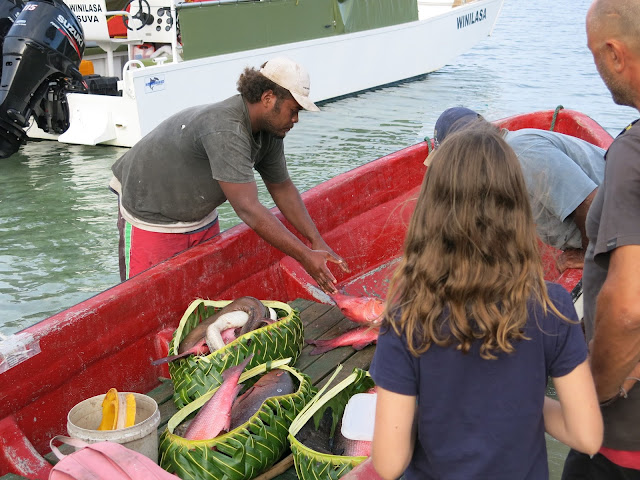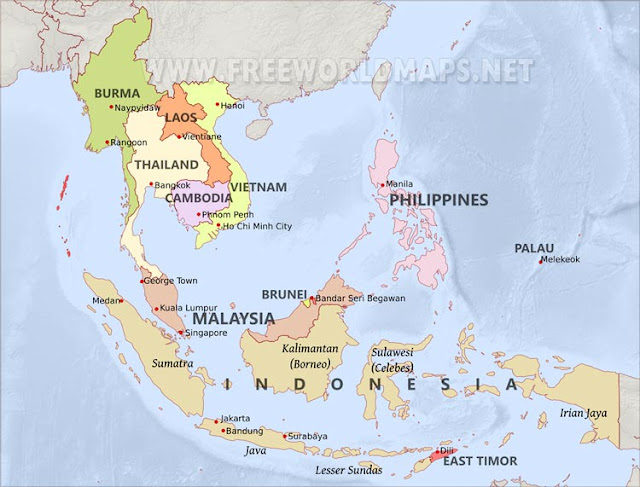The Rusty Old Ship, Fulaga Memories Part 2
(Looking back on our experiences in Fulaga, Fiji)
Once a month. That’s how often a rusty, heeling supply ship arrived in the Fulaga harbor delivering food, supplies, and loved ones from the large city of Suva. From our boat, we could see villagers gathering on shore, hustling about, anticipating its arrival.
After school, we went ashore to see what everyone was up to. Groups of people were gathered around enormous pots set atop wood fires. Curious, we asked one woman what she was cooking.
 Beside the pot, empty clam shells were piled up by the hundreds. As she lifted the lid, steam billowed out, blocking our view momentarily. When the steam cleared, we could see hundreds of clams - bright orange, brown, and flesh colored - vibrating in the boiling sea water. PuMata offered me one, but I bowed my head, as politely as I could and said, “Vinaka” (thank you). I would consider myself an adventurous person in general, but when it comes to food, this midwest girl tends to stick to what she knows. The closest I’ve ever come to eating clams was in the canned condensed soup my mom used to serve up for lunch with those cute little oyster crackers. I tried my first mussel last year in New Zealand. And I’ve been known to sprint from the table to the restroom when my gag reflex refused to allow a new food to enter my body! (Ask Mark about my first encounter with a sushi roll on one of our earlier dates - not exactly the impression I wanted to make!)
Beside the pot, empty clam shells were piled up by the hundreds. As she lifted the lid, steam billowed out, blocking our view momentarily. When the steam cleared, we could see hundreds of clams - bright orange, brown, and flesh colored - vibrating in the boiling sea water. PuMata offered me one, but I bowed my head, as politely as I could and said, “Vinaka” (thank you). I would consider myself an adventurous person in general, but when it comes to food, this midwest girl tends to stick to what she knows. The closest I’ve ever come to eating clams was in the canned condensed soup my mom used to serve up for lunch with those cute little oyster crackers. I tried my first mussel last year in New Zealand. And I’ve been known to sprint from the table to the restroom when my gag reflex refused to allow a new food to enter my body! (Ask Mark about my first encounter with a sushi roll on one of our earlier dates - not exactly the impression I wanted to make!)
I know that I should eat what I am offered, especially when my kids are watching. And the last thing I want to do is offend our hosts, but wouldn’t it be even more offensive if I took it and proceeded to hurl all over that discarded pile of clam shells at her feet??? This battle of gag vs. good manners would continue throughout our remote island travels, and the stakes would only get higher.
This time, though, our friends, Theo and Wanda, came to the rescue. They walked up, scooped the clam from her hand, and popped it into their mouths without even a moment’s hesitation. Theo grew up in Greece where he’s told us that they eat the entire head of the sheep as a delicacy - eyeballs, brains, and all! These boiled clams were nothing to his palate. (Remind me to bring plenty of granola bars with me if we ever get to Greece!)
On our walk to the village along the red dirt paths, we met a group of kids, a branch balanced between them, from which a woven palm basket swung. It was full of dried pandanus leaves (used in basket and mat weaving) that they were sending to Suva on the ship, too. It seemed that everyone was working hard to prepare items for family in Suva. I couldn’t understand why a remote village with limited resources would be sending things away to family members who live in a big city. Didn’t they need these things themselves? Didn’t their family members have easy access to so much more in the city?
Why send so much?
When we arrived in the village, it was abandoned. Turns out, everyone had gone down to the shore to meet the ship, so we decided to join the action. As we walked back, we heard, “SELO! SELO!” Our hosts told us it meant, “It’s coming! It’s coming!” People standing high on a hill watched for the ship to come, then, as if they were playing a life-sized game of telephone, the kids along the path excitedly echoed the message up to the village and down to the shore.
On the beach, men pulled fiberglass fishing boats up onto land and unloaded buckets of the day’s catch - eel, spotted rays, grouper, snapper, parrotfish, and assorted other sea creatures. Women and children sat, leaned against a shed, putting final labeling on plastic, bulk cracker containers that now held gifts and supplies to be sent to family in Suva. One woman used a permanent marker to scribble a note to a loved one on a discarded clam shell.
 |
| Fisherman's bounty of the morning |
 |
| Anxiously waiting for the ship to come in |
 |
| An old outrigger canoe makes for a waterfront view |
Many of the young people go to Suva for high school, staying with family. Then they find jobs and end up staying there for good. The young students enjoy the modern conveniences available to them in the city - satellite tv, electricity, plumbing, paved roads, cars, buses, etc. - and they leave their simple island dwellings behind, enticed by a new way of life. Most of the islands we visited had vacant huts, a sign of the changing times.
What would I choose if I had the choice?
In the remote islands, work looked more like survival - harvesting fields of cassava root, fishing, gathering clams, weaving baskets and mats for use in the homes. There was not a desperate need to earn money here, except to buy staples such as flour, rice, sugar, cooking oil and tea. A tiny shop in the village carried these items. Otherwise, one could survive on coconuts, papaya, fish, clams, and cassava which are free for the taking. Daily, they work to eat. There is no refrigeration and only a few propane stoves to share among the families, so food isn’t stored up or leftover. You eat what you have. Clothing and other items get shared and nothing only belongs to one person. If you have something, the village has it. Life is simple, uncluttered, connected.
Do these young students have a better life in the city? I silently wonder who ends up living longer, more fulfilling lives…
The shore buzzed with excitement as families were reunited with loved ones returning home. Others said tearful goodbyes to relatives who were boarding the ship to go back to Suva. All through the night, the fiberglass longboat zoomed to and from the shore, delivering supplies and picking up the loads of fresh seafood that had been lovingly collected and packaged up to send away. Huge, bright orange drums of diesel fuel were dropped into the water at the shoreline where they would float until low tide when they’d be rolled up to the storage shed. Carefully packaged wood carvings (for which this island is well known) and other handicrafts were loaded aboard to be sold in the Suva souvenir shops and craft markets. This was a fascinating glimpse into island economics. Supply and demand. Producers and consumers. Needs vs. wants.
The whole scene brings to mind a poem I studied in college by William Carlos Williams.
The Red Wheelbarrow
so much depends
upon
a red wheel
barrow
glazed with rain
water
beside the white
chickens
I imagine another version Williams would have written if he were sitting on the shore with us there...
The Rusty Old Ship
so much depends
upon
a rusty old
ship
anchored in the
bay
beside the crowded
shore
What would Williams write if he were a fly on your wall?









Comments
Post a Comment